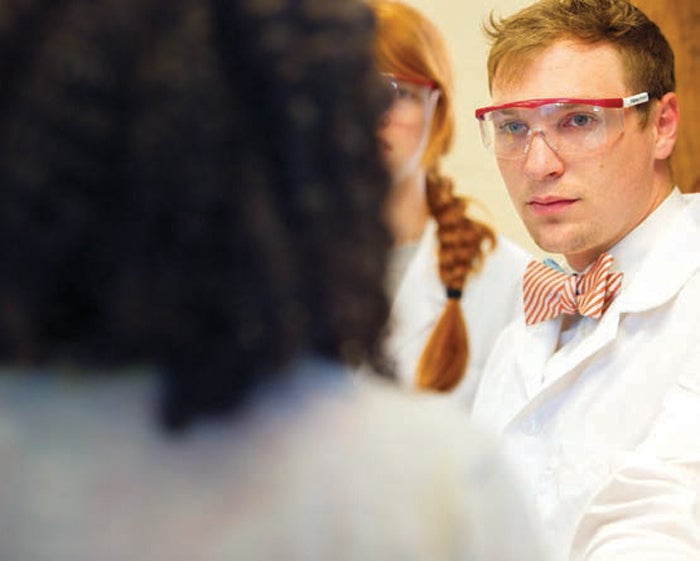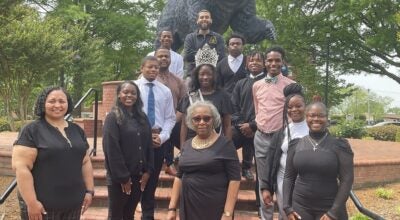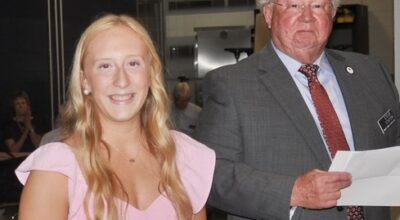Catawba College honors program receives $2 million donation
Published 12:00 am Thursday, February 1, 2018

- Student Justin Burroughs listens closely during a lab with the Catawba College honor's program. Submitted photo
Catawba College
SALISBURY — The Catawba College honors program looks forward to several years of growth thanks to a recent $2 million anonymous endowment.
The donation will help ensure the program’s long-term viability and will support the student growth that it is experiencing.
“Being in the honors program is just as challenging as it sounds, but the classes that are offered are amazing and the work is worth it,” said Catawba College sophomore Sarah Cuthbert.
Cuthbert’s comment is music to the ears of Honors Program administrators Maria Vandergriff-Avery and Sal Musumeci. Vandergriff-Avery has directed the program for the past eight years; Musumeci was appointed associate director this year.
The program has grown steadily over the past six years and its faculty administrators credit that growth to previous funding provided by the same anonymous donor. A $300,000 gift allowed the program to underwrite the cost of conference travel for students, enabled it to provide academic and social activities for its members each semester, and provided funding to bring the costs of international and domestic travel opportunities within reach for Honors Program students for a five-year period.
The recent gift is just as welcome, officials said.
“This was such welcome and affirming news for our program,” Vandergriff-Avery said. “It speaks to the fact that supporters both observe and approve of the wonderful growth our honors students can experience because opportunities for them are funded and prioritized.”
Participation in the program — which is based on student enrollment in honors courses — has grown from 88 total students during the 2011-12 academic year to 190 students during the 2017-18 academic year.
To enter the honors program, first-year students must have at least a 1220 combined SAT score and a 3.75 GPA. Students who earn a 3.5 during their first semester at Catawba are also given the opportunity to apply for the program.
Those students who graduate with honors must complete 21 semester hours of honors coursework, a portfolio of their honors program work, a portfolio narrative to explain how their studies met the goals of Catawba’s program, domestic or international travel and 40 hours of community service. The students must also write and present an honors thesis.
Since its inception at Catawba more than three decades ago, the mission of the honors program is to involve academically gifted students in a community of scholars who pursue challenging education experiences with faculty members.
Joshua Hill, the Whitener Award recipient in the graduating class of 2016, was one of those students who fulfilled all the honors requirements.
After graduating from Catawba, Hill accepted a graduate fellowship at N.C. State University to further his education in accounting and economics.
“It has resulted in me being a better student and has helped me develop skills that will ultimately make me more successful in my accounting career,” Hill said of the honors program.
The program’s first anonymous donation, payable over several years, allowed for “a culture shift in the program that allows Catawba to start showing up at conferences,” Musumeci said.
“Thanks to our generous donors, the honors program has been able to build on the strong curriculum that previous director Dr. Sheila Brownlow established in 2001 and to successfully meet most of our strategic plan goals in less than five years. We are excited about the recent changes that have afforded numerous opportunities for Catawba students and look forward to providing even more opportunities in the future,” Vandergriff-Avery said.
Catawba junior and cheerleader Molly Sue Harmon of Charlotte says the travel opportunities and the class options offered by the program attracted her to Catawba.
“I feel that I am a person who continuously thinks outside the box, throughout multiple disciplines,” Harmon said. “I have become better-rounded and more understanding of the community that I live in. I have grown to understand different cultures through my education in the honors program. I feel that I have been made into a strong person because of it.”
Looking ahead to her 2019 graduation from Catawba, Harmon is planning her honors thesis “about the multiple translations of the Bible over the years and how these translations have an impact not only on the formation of denominations within Christianity but how they impact religion, culture and the world as a whole.”
Harmon is among Catawba honors students who have attended and made presentations at honors conferences. She and two fellow students made a presentation last spring at the Southern Regional Honors Conference about an online magazine they had developed for their honors Adventure Writing class.
“It was a great experience and encouraged me to continue pursuing my love of writing throughout all of my coursework in the time to come at Catawba,” Harmon said.
After graduation, Harmon has her sights set on law school and plans to become a criminal lawyer.
To learn more about the Catawba honors program, visit www.catawba.edu/honors.





